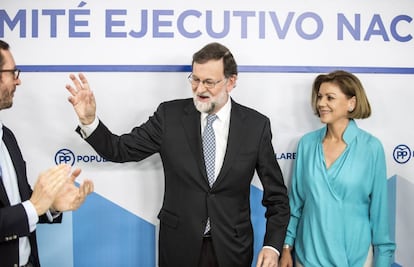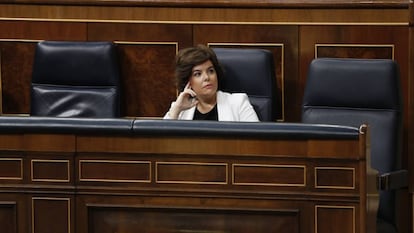Mariano Rajoy steps down as president of the Popular Party
The former prime minister announced his resignation on Tuesday, just days after he was ousted from office via a no-confidence motion filed by the Socialists

Former Spanish Prime Minister Mariano Rajoy, who was ousted from power last week in an unprecedented motion of no-confidence vote, announced on Tuesday that he would be stepping down from his role as president of the conservative Popular Party (PP) and leaving frontline politics.
Rajoy took on the presidency in 2003, having been hand-picked by outgoing PP Prime Minister José María Aznar. Since then, he has lost two general elections (2004 and 2008), and won three (2011, 2015 and 2016), spending nearly seven years in power (2011 to 2018).
Speaking to his party’s national executive committee in Madrid on Tuesday, a tearful Rajoy began his speech by saying: “I want my first words to be thanks to all of you for the support and the displays of affection.” He continued: “I have felt greatly comforted by your support these last days, which have not been easy for anyone.”
The time has come to bring this journey to an end
Former PM Mariano Rajoy
He soon turned his attention to Pedro Sánchez, the new prime minister of Spain, and the man behind the motion of no-confidence filed against Rajoy in response to a damning court ruling in the so-called Gürtel case, a corruption probe that has plagued the PP for years.
“Someone who has never won an election is now prime minister of the government,” he said of Sánchez, who has taken power with just 84 seats out of 350 in Congress thanks to the support of other parties including left-wing anti-austerity group Podemos and pro-Catalan independence groups. “Many of you have suffered a similar situation: you have won elections but you have not been able to govern.”
In reference to the support Sánchez garnered in order for his vote to prosper, Rajoy stated that the new prime minister was accompanied by “sectarian pro-independence [parties], and populist groups, and that stigma will accompany this government from the first moment of its existence until the end.
“The PSOE has squandered its entire legacy to embark on a highly uncertain project, with bad traveling companions: the radical pro-independence Catalans and [pro-independence Basque nationalist] Bildu, something that has never before happened.”
The Sánchez government, he continued, has been born with “extreme weakness,” and with “budgets that we approved and that some of those who supported Mr Sánchez have already tried to veto.”
An extraordinary PP congress will be called to elect a new leader
In reference to the Gürtel ruling, which sparked this political crisis, Rajoy referred to the situation as one of “post-truth.” “The PP was not found criminally guilty for Gürtel, nor did the PP government have anything to do with the case, nor was it taken to court nor did it evade its political responsibilities.”
The ruling found former PP treasurer Luis Bárcenas guilty of evading more than €11.5 million in taxes between 2000 and 2009, and of taking €1.24 million in bribes in exchange for facilitating public contract awards to business figures. The three-judge panel also found that the PP as a legal entity benefited financially from Gürtel’s corrupt practices. It was sentenced to pay €245,492. Since the ruling was made public, Rajoy has insisted that the corruption case was something that belonged to the past.
Rajoy also pointed to what he considers his government’s achievements in the Spanish economy, stating that “yesterday we saw the best unemployment figures for May in our history, and we are about to achieve the highest level of people signed up to the Social Security system since July 2007.”
The view of Spain, he added, “is exactly the opposite to the one when we arrived in government.”
After thanking his party colleagues for their “enormous loyalty,” which elicited applause from the attendees, he announced that he would be standing down as president of the PP. “The time has come to bring this journey to an end.
“I have had the privilege of being your president for 14 years, the best of my political life,” he continued. “I want to thank you for your support and help… in all circumstances, when we were celebrating successes and when we were facing adversity.”
He added that he would continue to be a member of the party and that an extraordinary PP congress would be called to elect a new leader.
Internal battle for power

The abrupt exit of Rajoy from the Popular Party (PP) leadership has opened an internal battle within the conservative group. In the frame to replace him are the current regional premier of Galicia, Alberto Núñez Feijóo, outgoing Defense Minister María Dolores de Cospedal, outgoing Deputy Prime Minister Soraya Sáenz de Santamaría, current Congressional speak Ana Pastor and outgoing Health Minister Alfonso Alonso.
For now, Cospedal will remain in her role as general secretary of the PP, something that leaves her in a position of strength for the leadership battle. Weakened, however, is Santamaría, who has been left with simply her role as a deputy in Congress, and as such lacking any territorial influence or a platform from which she could campaign as a candidate.
English version by Simon Hunter.
Tu suscripción se está usando en otro dispositivo
¿Quieres añadir otro usuario a tu suscripción?
Si continúas leyendo en este dispositivo, no se podrá leer en el otro.
FlechaTu suscripción se está usando en otro dispositivo y solo puedes acceder a EL PAÍS desde un dispositivo a la vez.
Si quieres compartir tu cuenta, cambia tu suscripción a la modalidad Premium, así podrás añadir otro usuario. Cada uno accederá con su propia cuenta de email, lo que os permitirá personalizar vuestra experiencia en EL PAÍS.
¿Tienes una suscripción de empresa? Accede aquí para contratar más cuentas.
En el caso de no saber quién está usando tu cuenta, te recomendamos cambiar tu contraseña aquí.
Si decides continuar compartiendo tu cuenta, este mensaje se mostrará en tu dispositivo y en el de la otra persona que está usando tu cuenta de forma indefinida, afectando a tu experiencia de lectura. Puedes consultar aquí los términos y condiciones de la suscripción digital.








































